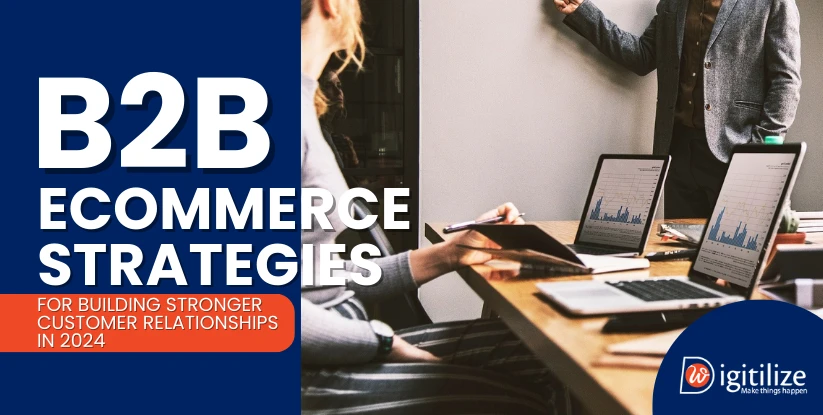B2B Ecommerce Strategies for Building Stronger Customer Relationships in 2024
 One of the sectors in the globe that is expanding the quickest is ecommerce. According to a report, global ecommerce sales would exceed $6.4 trillion by 2024. Nevertheless, it might be difficult to stand out and boost sales when there are so many ecommerce companies vying for the same clients. To draw in, hold on to, and convert their target customer base, ecommerce businesses must continuously innovate and improve their tactics. So, read the blog to know the B2B e-commerce customer relationship strategies UK in 2024.
Every procedure has to be as automated as feasible to fulfil the demands of a business-to-business user. At least 80% of B2B purchasers, according to B2B ecommerce trends, anticipate a B2C-like experience from the businesses they select. A significant proportion of B2B enterprises who experimented with personalized B2B shopping experiences report that it significantly improved their outcomes.
One of the sectors in the globe that is expanding the quickest is ecommerce. According to a report, global ecommerce sales would exceed $6.4 trillion by 2024. Nevertheless, it might be difficult to stand out and boost sales when there are so many ecommerce companies vying for the same clients. To draw in, hold on to, and convert their target customer base, ecommerce businesses must continuously innovate and improve their tactics. So, read the blog to know the B2B e-commerce customer relationship strategies UK in 2024.
Every procedure has to be as automated as feasible to fulfil the demands of a business-to-business user. At least 80% of B2B purchasers, according to B2B ecommerce trends, anticipate a B2C-like experience from the businesses they select. A significant proportion of B2B enterprises who experimented with personalized B2B shopping experiences report that it significantly improved their outcomes.
B2B eCommerce: What is it?
Businesses that use the B2B ecommerce business model sell online to other businesses. This contrasts with business-to-consumer (B2C) ecommerce. Sales cycles in the B2B eCommerce model are often lengthier because of a number of variables, including the existence of additional stakeholders, greater order volumes, and higher expenses. Manufacturing is one sector of the economy that is well-known for B2B eCommerce, with companies producing parts and selling them in large quantities to other companies. Manufacturers of microchips, for instance, create pieces and market them to other companies. Apple iPhone microchips are produced by a single firm. Apple buys these chips and uses them to make the iPhone, which is subsequently sold to consumers. Many businesses have been compelled to change their products and go D2C, or in this case, D2B, due to unforeseen circumstances like COVID-19. Many B2B organisations now want to start digital transformations sooner rather than later as a result of these developments. Even while manufacturing firms have historically reigned as the leading B2B eCommerce brands, the business model might still be advantageous to your B2B company. The key to B2B eCommerce is segmentation and matching the appropriate product to the appropriate persona. Not all of your clients have to be manufacturing companies to take advantage of different product variants or higher numbers.The Top 12 Worldwide Strategies for B2B eCommerce Marketplaces to Take Over the Market in 2024
 Because internet shopping is so convenient, having a strong online store may help you both draw in new customers and provide your existing ones the best practices for B2B e-commerce in the UK.
The B2B eCommerce market is growing rapidly. Therefore, in order to stay relevant and expand, sellers need to use innovative worldwide B2B eCommerce marketplace-winning strategies. To outperform other vendors, you need to understand the mindset of B2B buyers, plan for long-term growth, and develop creative relationship-building techniques. Let’s look at the best B2B ecommerce marketplace tactics for growing your business.
Because internet shopping is so convenient, having a strong online store may help you both draw in new customers and provide your existing ones the best practices for B2B e-commerce in the UK.
The B2B eCommerce market is growing rapidly. Therefore, in order to stay relevant and expand, sellers need to use innovative worldwide B2B eCommerce marketplace-winning strategies. To outperform other vendors, you need to understand the mindset of B2B buyers, plan for long-term growth, and develop creative relationship-building techniques. Let’s look at the best B2B ecommerce marketplace tactics for growing your business.
-
Examine the B2B Buyers’ Psychological State
-
Make Self-Service Available To Customers
-
Highlighting Product Specifications and Features
 Customer research continues throughout the purchase process, even though it starts with the sales funnel. Your eCommerce websites should make it easy for customers to locate the answers they need. Customers are more likely to leave if they have to look for information before finding what they need. Consider including a “question and answer” section on your website so that visitors may interact with your product mix and ask questions right away. This is one of the B2B ecommerce strategies for building stronger customer relationships in 2024. This incremental material will also support SEO efforts because it will be updated with relevant, new content. In product descriptions using bullets, enumerate the attributes of certain items.
Customer research continues throughout the purchase process, even though it starts with the sales funnel. Your eCommerce websites should make it easy for customers to locate the answers they need. Customers are more likely to leave if they have to look for information before finding what they need. Consider including a “question and answer” section on your website so that visitors may interact with your product mix and ask questions right away. This is one of the B2B ecommerce strategies for building stronger customer relationships in 2024. This incremental material will also support SEO efforts because it will be updated with relevant, new content. In product descriptions using bullets, enumerate the attributes of certain items.
-
Give Priority to Social Interactions
-
Invest in Headless Commerce Systems
-
In B2B, generative AI will begin to be used.
-
Mobile-First Approach
-
Ecommerce Will Become More Sustainable
-
The use of dynamic pricing will grow in popularity
 Dynamic pricing is about to become a popular B2B ecommerce idea. Even while the vacation rental business has long employed this tactic, the eCommerce sector has recently been interested in its use. B2B companies now have more control over their pricing strategies because to advancements in technology. This is one of the B2B ecommerce strategies for building stronger customer retention for B2B e-commerce in 2024. This gives businesses the ability to explore the idea of using variations in supply and demand to modify their prices in real-time. Adopting real-time pricing might help B2B organizations stay competitive in light of the current spike in inflation rates. It might not only help with more effective pricing control but also improve the customized client experience.
Dynamic pricing is about to become a popular B2B ecommerce idea. Even while the vacation rental business has long employed this tactic, the eCommerce sector has recently been interested in its use. B2B companies now have more control over their pricing strategies because to advancements in technology. This is one of the B2B ecommerce strategies for building stronger customer retention for B2B e-commerce in 2024. This gives businesses the ability to explore the idea of using variations in supply and demand to modify their prices in real-time. Adopting real-time pricing might help B2B organizations stay competitive in light of the current spike in inflation rates. It might not only help with more effective pricing control but also improve the customized client experience.
-
The growing significance of openness
-
One important source of income will be after-sales support.
-
Increasing interest in real-time inventories
FAQ
Frequently Asked Questions
In 2024, a number of factors, such as cutting-edge technology, a trend towards sustainability, and an emphasis on worldwide development, will drive the maturity of the B2B eCommerce industry.
By automating procedures, forecasting customer behaviour, and making tailored suggestions, AI integration improves B2B operations efficiency and eventually boosts overall business profitability.
Sustainability plays a major role in the maturing process as companies realise how important it is to implement eco-friendly procedures.
It is anticipated that B2B marketing will persist on its path of innovation and metamorphosis in 2024, propelled by technological breakthroughs, evolving client demands, and the introduction of powerful artificial intelligence technologies.
It has been observed that a B2B campaign's success is determined by the total efficacy of four essential components of B2B marketing: Metrics, Creative, Strategy, and Insight.
B2B buyers of today desire the same simple, customised shopping experience that they get from their consumer life. A customised experience is crucial, even for business-to-business buyers, and speed is unavoidable.

